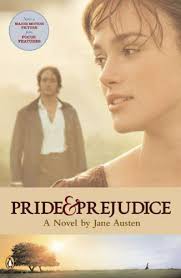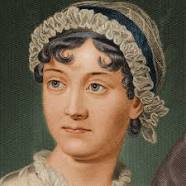Pride and Prejudice Page #4
Pride and Prejudice is a romantic novel by Jane Austen, first published in 1813. The story charts the emotional development of the protagonist, Elizabeth Bennet, who learns the error of making hasty judgments and comes to appreciate the difference between the superficial and the essential. The comedy of the writing lies in the depiction of manners, education, marriage, and money during the British Regency period.
Mr. Bingley inherited property to the amount of nearly a hundred thousand pounds from his father, who had intended to purchase an estate, but did not live to do it. Mr. Bingley intended it likewise, and sometimes made choice of his county; but as he was now provided with a good house and the liberty of a manor, it was doubtful to many of those who best knew the easiness of his temper, whether he might not spend the remainder of his days at Netherfield, and leave the next generation to purchase. His sisters were anxious for his having an estate of his own; but, though he was now only established as a tenant, Miss Bingley was by no means unwilling to preside at his table--nor was Mrs. Hurst, who had married a man of more fashion than fortune, less disposed to consider his house as her home when it suited her. Mr. Bingley had not been of age two years, when he was tempted by an accidental recommendation to look at Netherfield House. He did look at it, and into it for half-an-hour--was pleased with the situation and the principal rooms, satisfied with what the owner said in its praise, and took it immediately. Between him and Darcy there was a very steady friendship, in spite of great opposition of character. Bingley was endeared to Darcy by the easiness, openness, and ductility of his temper, though no disposition could offer a greater contrast to his own, and though with his own he never appeared dissatisfied. On the strength of Darcy's regard, Bingley had the firmest reliance, and of his judgement the highest opinion. In understanding, Darcy was the superior. Bingley was by no means deficient, but Darcy was clever. He was at the same time haughty, reserved, and fastidious, and his manners, though well-bred, were not inviting. In that respect his friend had greatly the advantage. Bingley was sure of being liked wherever he appeared, Darcy was continually giving offense. The manner in which they spoke of the Meryton assembly was sufficiently characteristic. Bingley had never met with more pleasant people or prettier girls in his life; everybody had been most kind and attentive to him; there had been no formality, no stiffness; he had soon felt acquainted with all the room; and, as to Miss Bennet, he could not conceive an angel more beautiful. Darcy, on the contrary, had seen a collection of people in whom there was little beauty and no fashion, for none of whom he had felt the smallest interest, and from none received either attention or pleasure. Miss Bennet he acknowledged to be pretty, but she smiled too much. Mrs. Hurst and her sister allowed it to be so--but still they admired her and liked her, and pronounced her to be a sweet girl, and one whom they would not object to know more of. Miss Bennet was therefore established as a sweet girl, and their brother felt authorized by such commendation to think of her as he chose. Chapter 5 Within a short walk of Longbourn lived a family with whom the Bennets were particularly intimate. Sir William Lucas had been formerly in trade in Meryton, where he had made a tolerable fortune, and risen to the honour of knighthood by an address to the king during his mayoralty. The distinction had perhaps been felt too strongly. It had given him a disgust to his business, and to his residence in a small market town; and, in quitting them both, he had removed with his family to a house about a mile from Meryton, denominated from that period Lucas Lodge, where he could think with pleasure of his own importance, and, unshackled by business, occupy himself solely in being civil to all the world. For, though elated by his rank, it did not render him supercilious; on the contrary, he was all attention to everybody. By nature inoffensive, friendly, and obliging, his presentation at St. James's had made him courteous. Lady Lucas was a very good kind of woman, not too clever to be a valuable neighbour to Mrs. Bennet. They had several children. The eldest of them, a sensible, intelligent young woman, about twenty-seven, was Elizabeth's intimate friend. That the Miss Lucases and the Miss Bennets should meet to talk over a ball was absolutely necessary; and the morning after the assembly brought the former to Longbourn to hear and to communicate. “You began the evening well, Charlotte,” said Mrs. Bennet with civil self-command to Miss Lucas. “You were Mr. Bingley's first choice.” “Yes; but he seemed to like his second better.” “Oh! you mean Jane, I suppose, because he danced with her twice. To be sure that did seem as if he admired her--indeed I rather believe he did--I heard something about it--but I hardly know what--something about Mr. Robinson.” “Perhaps you mean what I overheard between him and Mr. Robinson; did not I mention it to you? Mr. Robinson's asking him how he liked our Meryton assemblies, and whether he did not think there were a great many pretty women in the room, and which he thought the prettiest? and his answering immediately to the last question: 'Oh! the eldest Miss Bennet, beyond a doubt; there cannot be two opinions on that point.'” “Upon my word! Well, that is very decided indeed--that does seem as if--but, however, it may all come to nothing, you know.” “My overhearings were more to the purpose than yours, Eliza,” said Charlotte. “Mr. Darcy is not so well worth listening to as his friend, is he?--poor Eliza!--to be only just tolerable.” “I beg you would not put it into Lizzy's head to be vexed by his ill-treatment, for he is such a disagreeable man, that it would be quite a misfortune to be liked by him. Mrs. Long told me last night that he sat close to her for half-an-hour without once opening his lips.” “Are you quite sure, ma'am?--is not there a little mistake?” said Jane. “I certainly saw Mr. Darcy speaking to her.” “Aye--because she asked him at last how he liked Netherfield, and he could not help answering her; but she said he seemed quite angry at being spoke to.” “Miss Bingley told me,” said Jane, “that he never speaks much, unless among his intimate acquaintances. With them he is remarkably agreeable.” “I do not believe a word of it, my dear. If he had been so very agreeable, he would have talked to Mrs. Long. But I can guess how it was; everybody says that he is eat up with pride, and I dare say he had heard somehow that Mrs. Long does not keep a carriage, and had come to the ball in a hack chaise.” “I do not mind his not talking to Mrs. Long,” said Miss Lucas, “but I wish he had danced with Eliza.” “Another time, Lizzy,” said her mother, “I would not dance with him, if I were you.”
Translation
Translate and read this book in other languages:
Select another language:
- - Select -
- 简体中文 (Chinese - Simplified)
- 繁體中文 (Chinese - Traditional)
- Español (Spanish)
- Esperanto (Esperanto)
- 日本語 (Japanese)
- Português (Portuguese)
- Deutsch (German)
- العربية (Arabic)
- Français (French)
- Русский (Russian)
- ಕನ್ನಡ (Kannada)
- 한국어 (Korean)
- עברית (Hebrew)
- Gaeilge (Irish)
- Українська (Ukrainian)
- اردو (Urdu)
- Magyar (Hungarian)
- मानक हिन्दी (Hindi)
- Indonesia (Indonesian)
- Italiano (Italian)
- தமிழ் (Tamil)
- Türkçe (Turkish)
- తెలుగు (Telugu)
- ภาษาไทย (Thai)
- Tiếng Việt (Vietnamese)
- Čeština (Czech)
- Polski (Polish)
- Bahasa Indonesia (Indonesian)
- Românește (Romanian)
- Nederlands (Dutch)
- Ελληνικά (Greek)
- Latinum (Latin)
- Svenska (Swedish)
- Dansk (Danish)
- Suomi (Finnish)
- فارسی (Persian)
- ייִדיש (Yiddish)
- հայերեն (Armenian)
- Norsk (Norwegian)
- English (English)
Citation
Use the citation below to add this book to your bibliography:
Style:MLAChicagoAPA
"Pride and Prejudice Books." Literature.com. STANDS4 LLC, 2025. Web. 5 Feb. 2025. <https://www.literature.com/book/pride_and_prejudice_9>.








Discuss this Pride and Prejudice book with the community:
Report Comment
We're doing our best to make sure our content is useful, accurate and safe.
If by any chance you spot an inappropriate comment while navigating through our website please use this form to let us know, and we'll take care of it shortly.
Attachment
You need to be logged in to favorite.
Log In